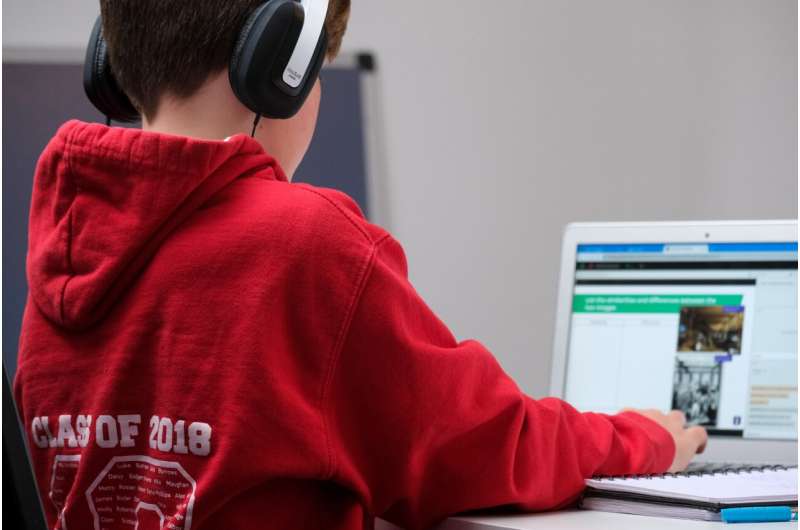This article has been reviewed according to Science X's editorial process and policies. Editors have highlighted the following attributes while ensuring the content's credibility:
fact-checked
trusted source
proofread
Emergency remote teaching during COVID-19 lockdown brought families closer together, introduced challenges

School closures and emergency remote teaching caused by the COVID-19 pandemic put a particular strain on families with children with special educational needs. Yet, most parents felt competent in supporting the learning and remote schooling of their children, and they also enjoyed the increased freedom and autonomy, which made it possible to structure daily life according to their family's needs and preferences. However, parents were nevertheless also concerned about the learning, well-being and relationships with friends of their children.
Emergency remote teaching forced families to tackle a new kind of challenge, as parents had to balance between the demands of their work and those of their children's remote schooling. A new study among 120 parents in Finland, conducted by the University of Eastern Finland and the University of Turku, focuses on parents' perspectives regarding their competence, autonomy, and relatedness, in relation to the schooling of their children with special educational needs.
Parents hoped for better teacher-parent interaction
Parental well-being is crucial to positive parent-child interaction, as well as to supporting child well-being. This is why the researchers wanted to pay attention to the strengths and challenges parents experienced regarding emergency remote teaching of their children with special educational needs at the beginning of the lockdown in Finland.
"Earlier studies have shown that emergency remote teaching and lockdowns had a major impact on the life of children with special educational needs, and on their families. For instance, the availability of therapy, rehabilitation and mental health support was often be reduced during lockdown. Children reacted to these changes with their behavior, since there were also challenges related to children's basic needs, such as social interaction, sleeping and eating," Assistant Professor Kaisa Pihlainen of the University of Eastern Finland says.
Maintaining routines and essential relationships is crucial for many children with special educational needs. In some children, breaking routines caused anxiety, depression, or rule-breaking or aggressive behavior.
"When emergency remote teaching began, parents felt that they did not receive adequate support from the school or from teachers, and home-school interaction was inadequate especially for children with special educational needs. According to parents, teachers did not ask about their views on things, nor enquired about the workload caused by remote schooling."
According to Pihlainen, it seems that maintaining and offering different forms of support affect not only the learning of children, but also the well-being of their parents.
Hectic school environment replaced by more peaceful learning at home
Although most parents reported that they were able to support the learning and remote schooling of their children, flexibility on the part of their employer was needed. Some parents felt that their work kept piling up or was done poorly as a result of providing support for their children: after all, some of children needed constant parental support for their learning.
From the perspective of family dynamics, remote schooling brought children and parents closer together. Instead of the hectic daily life of schools, parents were able to create their own routines at home, and children, for example, enjoyed their meals better than at school. In families with two parents, shared responsibility also supported parental well-being in the new situation.
Remote schooling also enabled the educational content to be broken down into smaller bits, allowing children to progress at their own pace.
Toward increasingly individualized learning?
Pihlainen says that the results of the study confirm earlier findings. The pandemic did not treat families equally: parents with a higher level of education were better equipped to support their children, whose learning wasn't hampered by remote schooling.
"In the future, finding ways to strengthen all parents' capacity to support their children's learning as part of the basic mission of the school is something to look into."
According to Pihlainen, the benefits of remote teaching should also be reaped. The traditional school environment can be noisy and restless, in contrast to the possible peace and quiet of home. Being able to progress at one's own pace and having the opportunity to concentrate support well-being and promote learning.
"We could consider how these observations can be made use of in the everyday life of schools, as well as on any future periods of remote teaching. Could our schools in the future offer calmer environments for learning and enable a more flexible and individualized pace of learning? Technology could also be better utilized, for example in the case of children's travel or long-term illness," Pihlainen concludes.
The findings are published in the European Journal of Special Needs Education.
More information: Kaisa Pihlainen et al, Parents' competence, autonomy, and relatedness in supporting children with special educational needs in emergency remote teaching during COVID-19 lockdown, European Journal of Special Needs Education (2022). DOI: 10.1080/08856257.2022.2159280
Provided by University of Eastern Finland





















